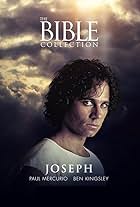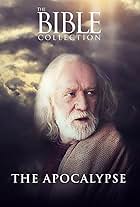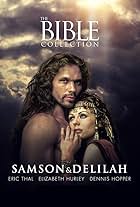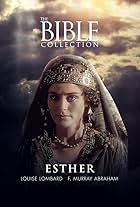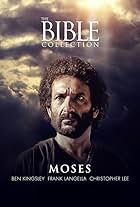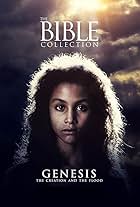Advanced search
- TITLES
- NAMES
- COLLABORATIONS
Search filters
Enter full date
to
or just enter yyyy, or yyyy-mm below
to
to
to
Exclude
Only includes titles with the selected topics
to
In minutes
to
1-12 of 12
- The Biblical story of Joseph, who was sold to slavery by his brothers who were jealous of his prophetic abilities to analyze dreams and of his being their father's favorite.
- A movie about the life, work and death of Jesus as we know it from the Bible.
- It is 90 A.D., and the Roman Empire is being run by the Emperor Domitian, who has declared himself to be God, and ruler over heaven and Earth. The Christians, who do not recognize his divinity, are a thorn in his side, and he is having them cruelly persecuted. The small village in Asia Minor, to which the aged apostle John has withdrawn, is also attacked by Roman soldiers. As if by a miracle, John is the only person to escape the slaughter, and he receives divine orders to write down the visions he will have, and communicate them to the Christian communities in the Roman provinces of Asia. The voice tells him that they should discover what is and what will happen thereafter. Among the Christians of Asia Minor, who believe that John is dead, everyone is deeply worried about being persecuted. Gaius, the community elder in Smyrna, is concerned that only a few believers still dare come to the ritual supper. Under these circumstances, Christianity can no longer exist. But at this point, the young Irene appears at the secret meeting. She is convinced that John, who could give the Christians back their courage, is still alive, because a certain Theophilus, who is being held captive by the Romans on the island of Patmos, is in contact with him, and had a letter sent to her. In it, John describes his vision of Heaven: And behold, a throne was set in Heaven, and one sat on the throne, and out of the throne proceeded lightnings and thunderings and voices. And there were seven lamps of fire burning before the throne, and in the midst of the throne, and round about the throne, were four beasts full of eyes before and behind. And the first beast was like a lion, and the second beast like a calf, and the third beast had a face as a man, and the fourth beast was like a flying eagle. And I saw in the right hand of Him that sat on the throne a book that was sealed with seven seals. Neither Gaius, nor the other adult believers, understand what John means by this. Only a little child among them, also named John, grasps the sense of it: John realizes that the throne belongs to God, and sees the seven lamps of fire as the seven Christian communities of Asia Minor, together with the four elements and the book of seals with the mystery of faith that brings salvation. Yet the letter's mysterious origins make Gaius skeptical. He is only prepared to believe in the integrity of this vision, if John really is still alive. Old Theophilus, who in reality is John himself, has been sent to the prison island of Patmos, ruled by the corrupt Roman official Corvus, as a scribe, while the other prisoners have to do hard labor in the mines. Many of them hate Theophilus (John) because of the special treatment he is receiving, but above all, because he is a Christian. Nevertheless, he does succeed in converting some of his fellow prisoners to Christianity, such as the young scribe Demetrius, who is planning to escape along a secret tunnel. When the shaken John tells his companions about the crucifixion of the Savior, they realize that he was there at the time, and is actually John. He falls into a trance and experiences a new vision of Heaven: And one of the elders said unto me, Weep not: behold, the Lion of the tribe of Juda, the Root of David, hath prevailed to open the book, and to loose the seven seals thereof. And I beheld, and, lo, in the midst of the throne and of the four beasts stood a Lamb as it had been slain, having seven horns and seven eyes. And he came and took the book. And I saw, and behold a white horse: and he that sat on him had a bow; and a crown was given unto him: and he went forth conquering, and to conquer. Meanwhile, in Smyrna, the young Irene has taken her leave of Valerius, whom she loves with a pure heart. She does not realize that he is not a Christian at all, but a spy working for the notoriously brutal Roman general Rufus, who has been ordered by Domitian to persecute Christians in Asia Minor. Valerius is a Roman soldier, born as a slave, he has his foster-father Rufus to thank for everything he has now become. He therefore has to obey when Rufus sends him to Patmos. Disguised as a prisoner, Valerius is told to find out whether John is still alive, because there are incessant rumors that he is, and they are leading to unwelcome solidarity among the Christians. Meanwhile Irene, with the help of her brother Jonicus, who visits Patmos regularly as a trader, gains access to the prison camp there. She recognizes Valerius from a distance and gets very worried about him. She embarked on all these dangers for the sake of John. However, her greatest desire is to see the last living Apostle, and to tell everyone about him. John trusts her, and confides in her under the seal of secrecy. She receives his visions in written form and promises to circulate the text among the Christians. Meanwhile on Patmos, Valerius tries to gain the trust of the Christian prisoners by defending the old Sostenes against the guards and suffering severe punishment as a result. Bound to a cross, he is left in the burning sunshine, but John is the only one who dares give him any water. And to Valerius' great surprise, he seems to know all about him and Rufus. In the hell of the prison camp, where violence and resentment reign, John often wonders about his mission: why has the Lord trapped him on this island, instead of sending him out into the world to spread the glad tidings? Then, surrounded by his companions, he falls into a trance, and again he sees himself in Heaven, with the Lamb on the throne. It is being threatened by a heavily armed knight on a red horse who is bringing hatred and war to humanity. Then a black horse appears whose rider is holding a pair of scales: he is the bringer of injustice and selfishness. Meanwhile, Rufus has ordered the island's governor Corvus to come and see him to tell him to show more severity, especially toward the Christians. Corvus is worried about losing his lucrative job, and so he tells his guards to be even more watchful than before. As a result, he notices that Irene has slipped into the camp again with Jonicus, to collect John's latest message. However, Jonicus cleverly manages to talk the guards out of searching either himself or his sister. John's visions become increasingly frequent and exhaust his strength. Nevertheless, Demetrius is still hoping to be able to get him off the island. The tunnel is ready, and the escape is planned for that evening. But when John supports the maltreated Sostenes, he incurs the wrath of the governor. He is imprisoned and the escape plans are scrapped. In his prison cell, John has a new vision: the Lamb breaks the fourth seal and again a horse appears, the pale horse that brings death into the world, plagues and famines, accidents and earthquakes. Only the love of God can defeat it. That night, numerous prisoners want to use the tunnel to escape, but it is discovered by the guards, and the fugitives are slaughtered. For Demetrius, all hope of rescue has now vanished. But John consoles him, telling him that it is God's will that they remain here on the island. Blessed are the poor, for theirs is the kingdom of Heaven, Jesus announces to him in the vision. And then he sees a huge number of people in Heaven: They called in a loud voice: Salvation cometh from our God. The Christians of Asia Minor, all in very great danger, cling to this belief, for the Romans are murdering them all, women and men, young and old alike. Irene and Ionicus put their lives into very great danger and, with the help of a guard, manage to free John and the other Christians from the camp, the Roman spy Valerius among them. A ship is waiting at the harbor. But John is too old and weak to shake off the guards pursuing them. He takes his leave of his companions and hides in a cave together with Valerius, who is transformed by the old man's influence, and becomes his helper. In the cave, John goes into a prophetic trance and has his last vision: And when the Lamb had opened the seventh seal, there was silence in heaven. And I saw the seven angels which stood before God, and to them were given seven trumpets. When the angels blew one after the other into the trumpets, hail, fire, and locusts destroyed the Earth, the sea turned to blood, darkness covered the Earth and the Day of Judgment arrived. And I saw a new heaven and a new Earth, and there shall be no more death, neither sorrow, nor crying, neither shall there be any more pain. Meanwhile Irene, Jonicus and Demetrius are arrested by Corvus and his men, and Valerius and John are found in their cave, their lives are forfeited. But at this point, Rufus arrives, and not only frees his foster son Valerius, but also the other captive Christians. It turns out that the Emperor Domitian is dead, and his successor has announced an amnesty. The persecution of the Christians is over. John, his companions, and the Christian communities all thank God for their salvation. Freed from his duty toward his foster-father, Valerius is finally free to embrace his beloved Irene.
- Mara and her husband Manoa are both upstanding and religious Israelites living under the harsh and unjust rule of the Philistines. Much to their regret, they have not been able to have children. One day, a mysterious stranger appears to Mara and promises her that she will bear a son whom she is to call Samson. The stranger tells her that as one chosen by God Samson will fight the Philistines, will have immense strength at his disposal, but that he may never cut his hair (or drink alcohol); otherwise this gift will be lost. Samson is born and as foretold he grows into a boy with amazing strength. As time passes, Samson becomes an attractive young man and young women begin to interest him more and more. Naomi, a pretty but rather melancholic girl, falls deeply in love with him. During a walk Samson learns the young woman's story. When she was a small child, her village was exterminated by the Philistines and her whole family butchered. Since then Naomi has not only been in mourning, but she harbors an unbridled desire for retaliation. She tries to convince Samson to join a group of young people planning an insurrection. Samson with his incredible strength could be a symbol, a hero, of this uprising! Initially Samson rejects the idea, but when Naomi provokes a confrontation with the Philistines he naturally hurries to her rescue. Soon the news spreads, not only to the Israelite villages but also to the Philistine royal palace in Gaza, that an Israelite by the name of Samson has killed several Philistines with his bare hands. When King Hanun, his hot-tempered son Sidqa and General Tariq hear this, they are anything but enthusiastic. They deliberate about what can be done to restrain this Samson before a revolt breaks out. Delilah, the king's beautiful, seductive and scheming niece insists on being present during these conversations. Samson is still not fully aware of the role he is supposed to play for his people. God has not yet given him a sign. One day he sneaks into a Philistine camp without having an exact plan on how he is going to proceed against them. Here he sees Delilah for the first time and is immediately fascinated by her. Just at this moment, a wounded desert lion bounds enters the camp and attacks Delilah. Without hesitating, Samson confronts the lion unarmed and after a terrible struggle, overpowers it with his bare hands. For reasons unfathomable to the Philistines who witness this, General Tariq lets the Israelite Samson go free. Like Delilah, the experienced general has been impressed by the scene and is curious to find out what sort of person Samson is. Back in the royal palace Tariq, who has grown wise with age, suggests concluding peace with the Israelites to King Hanun. The General, however, cannot put this idea across against the fierce resistance of Prince Sidqa, who is planning to take Samson prisoner. To accomplish this he bribes two Israelites, Jehiel and Amram childhood companions of Samson's. The pair, sons of Samson's friend and mentor Ira, are jealous of Samson because they would like to assume the leadership of the Israelites themselves. They see their position endangered by Samson and are only too happy to get rid of him. Initially, the plan seems to work and Samson is caught in a trap. Thanks to his strength, he succeeds in breaking free and fleeing from his captors. With Yoram's help Samson manages to hide in Ira's home. When Samson and Ira learn that Jehiel and Amram, of all people are behind the attempt on Samson's life, Ira disowns his sons. Angered and dissapointed by the betrayal of his own people Samson flees into the desert. There, he comes upon the corpse of the lion he killed and sees that bees have nested in it. Samson is so hungry that he contravenes God's command and eats the impure honey. From now on Samson will stray from the path of righteousness and will only find his way back after taking many risks and suffering much pain. In the desert, Samson encounters Amrok, an Israelite, who has been raised by the Philistines like one of their own. Amrok invites Samson to the village of his foster-father Harach, where Samson, much to his amazement, is very warmly received. Samson is surprised to be received in such a friendly manner by Harach and his family. His concept of the Philistines as enemies threatens to collapse, especially after he sets eyes on Rani, Harach's pretty and delightful daughter. Samson and Rani are immediately strongly attracted to each other and after Harach and even King Hanun have declared their consent, Samson and Rani decide to marry. A solemn wedding banquet is to crown the ceremony. The King even sends thirty Philistines to preside at the function. During the course of the festivities, the atmosphere becomes very lively and Samson poses a riddle promising the one who guesses the answer thirty sheep and festive attire. After being put under pressure by Mahal, the leader of the Philistine wedding group, Rani discloses the answer to the riddle. Angered and disappointed by this betrayal, Samson slays the thirty Philistines so that Mahal can have their clothes as a reward. Samson's vengeance is not yet over: in his anger he sets the fields of the Philistines on fire, conjuring up an even greater disaster. Following orders from Prince Sidqa, Mahal kills Rani and Harach for having betrayed their people As Samson visits the town Rani came from, Amrok tells him about the atrocities committed by Mahal. Samson, deeply moved by all this suffering, suddenly has a vague premonition that all is not well at home and decides to return to his parents. He arrives home to find his father Manoa on his deathbed. Shortly before Manoa passes away, father and son who have been estranged ever since Samson's marriage to Rani, reconcile. After Manoa's death, Samson hastily sets off again. He knows the Philistine henchmen cannot be far off and his does not want to endanger his mother. When Samson finally arrives in Gaza he sets about searching for the traitor Mahal, and once he has found him, kills him. The Philistines are alarmed when they hear that Samson is supposedly in the city. To cut off all routes of escape, they close the city gates. They are dismayed when they discover that the gates, weighing tons, have been lifted off their hinges and that Samson has disappeared. Since Samson apparently cannot be captured by conventional means, the royal court decides to use a woman's charms instead. Delilah is promised jewels and wealth to seduce Samson and worm out of him the secret of his supernatural strength. The inevitable comes to pass: Samson falls in love with the bewitching Delilah. The enchantress plays her part well and after much cajoling and teasing, she gets Samson to disclose his big secret: If his long hair were to be shorn he would lose all his strength. Although Delilah has to struggle with her feelings she finally cuts off his hair, thus enabling the Philistines to take Samson prisoner. Once they have him captured, they blind him for good measure. While languishing in prison, a blind and helpless Samson finally becomes conscious of his numerous mistakes and presumptuousness and recognizes God's greatness. Through his sufferings, the once proud and reckless youth matures into a humble and truly religious man. While performing forced labor every day, he prays that his hair will soon grow back so that he can fulfil his calling. In the meantime the Israelites under the leadership of Jehiel and Amram, instigate a revolt against the Philistines. This uprising is mercilessly crushed by General Tariq. Naomi is among the few survivors. She desperately wants to see Samson one more time. Overcoming all feelings of bitterness Naomi goes to Delilah to ask for her help. Delilah, whose conscience gives her no peace, is prepared to help Naomi, if Naomi can convince Samson to forgive her. A sumptuous feast is held in the temple of the Philistine god, Dagon. The highlight of the festivities is to be the presentation of the tamed and helpless Samson. During the course of the festivities, Delilah manages to speak to Samson. Blind and unsuspecting, and assuming she is Naomi, Samson gives Delilah a kiss of forgiveness on the forehead. The time has now come for him to complete his task. Samson, who has regained his strength, braces himself against the pillars of the temple and brings the walls of the whole temple tumbling down. While young Yoram, Naomi and Delilah are able to flee at the very last moment, the massive walls forever bury Samson, King Hanun and his son Prince Sidqa, General Tariq and countless Philistines beneath them.
- The Bible story of Esther starring Louise Lombard, F. Murray Abraham and Jurgen Prochnow.
- In the foreign land of Canaan lives Isaac, son of Abraham, with his clever, strong-willed wife Rebekah and his twin sons Esau and Jacob. The first-born, Esau, is a strong and fearless hunter with a voracious appetite for sensual pleasures. Jacob is a shepherd, more tender and compassionate han Esau. Just as Esau is the pride of his father, so is Jacob the apple of his mother's eye. Rebekah is convinced that Jacob, though the second born son, is the chosen one and the rightful heir of Isaac and Abraham. And she tells him that when she was with child, God announced to her: "Two nations are within thy womb. Two manner of men shall be delivered to you. The one shall be stronger than the other and the elder shall serve the younger". One day Esau returns from a hunt to find Jacob preparing a lentil porridge. Famished, he asks Jacob for some food. Jacob agrees, but on one condition: that Esau sell him his birthright. Since Esau ascribes little value to its meaning, he readily agrees and they conclude the pact. Time has passed. Isaac has grown old and nearly blind. It is time to pass on his paternal blessing to the firstborn. He asks Esau to hunt and prepare some game for him, after which he will give him his blessing. Rebekah knows she must act now. Cornering Jacob, she pressures him into deceiving Isaac so that he obtains the blessing instead of Esau. Jacob resists, but when Rebekah vows to take the blame for this ploy, he finally consents. And thus does Jacob trick his father. When Esau returns from the hunt and appears before his father, he explodes in anger when he learns of the scheme. Having obtained only a lesser blessing from Isaac, he vows to kill Jacob as soon as his father passes away. Isaac, following Rebekah's suggestion, advises Jacob to flee to Harran, to the home of Laban - Rebekah's brother, and to ask him to marry one of his daughters. Laden with gold, silver, skins, spices and oils, Jacob sadly leaves his home and his loved ones. Soon, however, he realizes that he is being followed: a Canaanite, one of Esau's brothers-in-law, robs him of the treasure that was to be his dowry. One night, as he is asleep, Jacob has a vision of a stairway with angel-like figures on it. During this vision God promises him protection and prosperity. The next morning, Jacob swears to remain faithful and devoted to God. After an arduous journey, Jacob arrives in Harran. Haggard and drained of his strength, he immediately forgets his fatigue when he sees a pretty young girl at the fountain. The girl is Rachel, the youngest daughter of his uncle Laban. And Jacob falls head over heels in love with her. Though Laban greets his nephew heartily, he cannot conceal his disappointment that Jacob has arrived without any gifts. Laban's two sons, Morash and Be'or, are less delighted by Jacob's arrival. Jacob soon asks Laban to let him marry Rachel, and he even accepts Laban's rigorous conditions: that Jacob become his indentured servant for a full seven years. Jacob proves to be a singularly successful herdsman and contributes mightily to the welfare of Laban's people. Thus after seven years, Laban is unwilling to let him leave and devises a cunning scheme... When Jacob awakens on the morning following the consummation of his marriage with Rachel, he is horrified to discover that he has slept with Rachel's older sister Leah instead. Laban forced Leah to take her sister's place in the dark tent. As Jacob rages, Laban claims that according to the law of the land, a father must marry off his older daughter first. He is willing, however, to make Jacob another offer: for another seven years in his service, he can take Rachel as his wife in one week's time. And again, Laban and his people enjoy seven more years of rich harvests and expanding flocks, all thanks to Jacob's superior abilities. But while the unloved Leah bears Jacob many children, Rachel, his one and only love, remains barren for many years, until Joseph finally sees the light of day. After his second period of indenture is over, Jacob strikes another deal with Laban, whereby he is allowed to assemble his own herd. His prosperity soon sparks the envy of Laban's sons Morash and Be'or, who accuse Jacob of deceiving them and of stealing their property. Jacob decides it is time to move back to Canaan, and flees with his wives, children and servants. As soon as Laban hears about their escape, he rounds up his sons and his men and gives chase. He finally meets up with Jacob on Mount Gilead. But before he can reach Jacob, God appears to Laban and warns him not to harm Jacob or his people. Jacob's most grueling ordeal, however, still awaits him: his meeting with his brother Esau. Fearing that Esau still intends to kill him, Jacob sends messengers with gifts to his brother to announce his coming. The messengers return sooner than expected, reporting that Esau is already on his way to meet him - with 400 armed men. Jacob sets up camp on the banks of the river Jabbok. That night, while his people await Esau with fear and trembling, Jacob withdraws to collect himself on the other side of the river. There Jacob is attacked by a mysterious being whom he cannot identify. It is an angel. As the struggle intensifies and the angel realizes that he cannot subdue Jacob, he strikes him fiercely on the hip. But Jacob, who gradually realizes who his adversary is, continues to grapple with him and refuses to relinquish his hold until the angel has blessed him. Ultimately the angel yields and gives Jacob the blessing together with the new name of "Israel". He thus confirms Jacob's right to the blessing which he originally obtained by deceit. The following morning, as Esau's army approaches, Jacob gathers his people behind him and awaits his brother. As Esau arrives at the head of his troops, Jacob humbly throws himself at his brother's feet. Esau breaks the tension by coming towards Jacob with open arms and welcoming him home. Reconciling their past differences, Jacob and Esau embrace.
- Abram a tribal leader denies all the local deities and finds the true God. Through many trials and tribulations he strengthens his faith.
- The tribes of Israel need to defeat the superior might of the Philistines: "Now appoint a king to lead us, such as all the other nations have." (I Samuel, 8:5). And so the prophet Samuel gives the Hebrews their first king, Saul, a simple farmer, who with God's help becomes a brave and mighty warlord who leads the united tribes of Israel against their enemies. Saul, however, has incessant doubts about his mission. Not trustful enough of divine wisdom, he acts of his own accord and thus sins against the Lord. The influential prophet Samuel turns away from Saul in order to select a new king according to God's will: David. He is still a young boy, tending sheep in the fields, when, secretly Samuel oints him as the next king of the Israelites. When David - as courageous as he is intelligent - emerges victorious from his encounter with Goliath, the Philistines' most powerful warrior, he becomes a hero. His fame arouses the jealousy of King Saul, who senses that David is going to dispute his right to be king - and tries to kill him. David flees from Saul, and finds many supporters and loyal companions who believe that he is destined to be king. In exile, David waits for his time to come, since he does not want to take the place of Saul by violence. He is young and in the prime of his strength, while King Saul is a broken man. When Saul falls upon his sword after losing a battle, David's hour is at hand. The new King David conquers Jerusalem. The magnificent city is to become the royal residence for the glorious hero, who now plans to leave the business of war to others in future and to become a King of Peace. However, this temperamental man, with so many years of battle behind him and still in the bloom of youth, is not predestined for a quiet, orderly life at all. Very soon he plunges into an illicit love affair with Bathsheba, a married woman - an affair that threatens to become the king's undoing when it turns out that she is expecting his child. To conceal his adulterous fatherhood, the king sends Bathsheba's husband Uriah - one of his best and most loyal soldiers - to his death, and then marries her. The prophet and royal adviser Nathan announces to David that his act will result in divine punishment: the Lord will not countenance such an outrage. Violence and evil will continue in David's own family and bring disaster upon the heads of the numerous sons born to David from his wives and concubines. Then the child of David and Bathsheba dies. She gives him another son, Solomon, but very soon David suffers another sharp blow of fate: his grown-up son Absalom kills one of his brothers for the latter's rape of his sister. David is far too mild in response to this: not only does he fail to bring the incestuous seducer to justice, he also leaves the fratricide unpunished. The king does not realise that he is gradually losing control over his family, and that his hold on the people is also growing weaker. For David is obsessed with his plan of building the finest and largest temple in the world in Jerusalem. He demands immense sums from the populace for this project, even though God has commanded him to leave the completion of the building to his successors. David's ambitious son Absalom thus finds it very easy to drum up support for a conspiracy against his father. After a fierce battle, culminating in Absalom's death, David makes it back to Jerusalem.
- David, now an old man, is still king of Israel. Among his sons, the ambitious Adonijah and the clever Solomon.
- Pharaoh Ramses II decrees the death of all Hebrew children, but Moses, placed in a basket on the Nile by his mother, is picked up by a princess and raised as the brother of the heir to the throne of Egypt.
- Saul of Tarsus is struck blind and converted to Christianity on the road to Damascus. Renamed Paul, he endures persecution while preaching Jesus' teachings, travelling widely until being imprisoned in Rome for his faith.
- An all-enveloping darkness. Suddenly, a child's voice, frightened, questioning, pierces the darkness... The first flickering rays of light begin to sculpt mysterious shapes out of the darkness ... Among them, a very old man. He reassures the child, exhorting him to see the wonders of the earth. And it is with this child's eyes that we will witness the creation of the world. Nature comes to life at the first light of dawn, recreating the seven days of the Creation. Adam appears, and is soon joined by Eve. Paradise could be theirs, but as time goes by, they grow restless, inquisitive... They approach the Tree of Knowledge - and discover pain, suffering and mortality. Their sons Cain and Abel play out a story that will continue to darken the Creation until the end of time. And angered by the corruption of Cain's progeny, by the lust and greed ruling the cities, God vows to wipe away his creatures and begin anew. With Noah and his family. The ark is built, the animals led into their pens, and the rain begins beating on the timbers, flooding the land, bringing fear and death. When the rains have devastated the world, the waters recede, the ark touches ground, and the dove sent out by Noah returns with an olive branch - the sign of new life and of a new pact with God.
